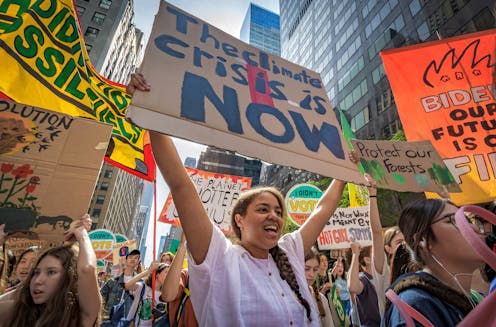If you want Americans to pay attention to climate change, just call it climate change
Phrases like ‘climate crisis,’ ‘climate emergency’ or ‘climate justice’ might seem to escalate the urgency, but a large survey shows they don’t help and may actually hurt.

You probably have been hearing phrases like “climate crisis,” “climate emergency” or “climate justice” more often lately as people try to get across the urgent risks and consequences of climate change. The danger is real, but is using this language actually persuasive?
It turns out that Americans are more familiar with – and more concerned about – climate change and global warming than they are about climate crisis, climate emergency or climate justice, according to a recent survey we conducted with a nationally representative sample of 5,137 Americans.
Moreover, we found no evidence that the alternative terms increased people’s sense of urgency, willingness to support climate-friendly policies or willingness to act.
The familiar terms – climate change and global warming – did at least as well, and sometimes better, than climate crisis and climate emergency in eliciting concern, perceived urgency and willingness to act. Climate justice consistently tended to do worse, likely in part because it was the least familiar. The responses were similar among Republicans, Democrats and independents.
Just keep it simple
In our work as research psychologists, we have explored how Americans respond to the ways climate change is communicated and have uncovered a need to use straightforward language.
For example, people we interviewed for a study published in 2021 felt that climate experts were talking over their heads with terms like “adaptation,” “mitigation,” “sustainability” and “carbon-dioxide removal.” They wanted experts to use more familiar terms instead.
This inspired us to write a quick guide to climate jargon, published in The Conversation. Using everyday language makes information easier to understand, and even highly educated people tend to prefer it.
Yet, experts often use complex jargon because it is familiar to them, and they may not realize it is unfamiliar to others.
How the terms evolved
It has become common to talk about climate change and global warming as if they have the same meaning, but there are differences. Climate change refers to changes in the overall climate, while global warming refers specifically to rising temperatures.
A historical review found that, in the past, people were less likely to associate the term climate change with the idea that humans are actively warming the planet than they were with the term global warming. Perhaps this is why Democrats used to like the term global warming, while the popularization of the term climate change has been credited to Frank Luntz, an adviser to the George W. Bush administration.
Past surveys also found that Democrats used to think of global warming as being more serious than climate change, while Republicans thought of climate change as more serious than global warming. But according to a recent review, these partisan differences have now faded, and a majority of Republicans and Democrats tend to express concern about both terms.
Alternative terms such as climate crisis, climate emergency and climate justice have been used to emphasize other aspects of climate change and to try to raise concern. In 2019, the British newspaper The Guardian switched to using climate crisis and climate emergency because it wanted to convey urgency.
Activists use the term climate justice to draw attention to climate change as a human rights challenge: Low-income people around the world suffer the most from the effects of climate change, despite being the least responsible for causing it.
The takeaway: Avoid overheated language
Right now, the terms climate crisis, climate emergency or climate justice are less familiar and elicit less concern than climate change or global warming.
Even if these terms become more commonplace, there is no guarantee that they will heighten concern or inspire action. In fact, studies have suggested that phrases like climate crisis could backfire if they don’t resonate with people.
Our advice: Don’t make the mistake of using overheated language. Just stick with familiar terms that people understand – use global warming when referring to rising temperatures and climate change for overall changes in the climate.
The present study was funded by the University of Southern California’s Wrigley Institute for Environmental Studies. Wändi Bruine de Bruin was additionally supported by a gift from the Golden Belt Community Foundation and receives funding from the Lloyd's Register Foundation, in part to inform climate change communications around the world.
Gale Sinatra receives funding from the National Science Foundation.
Read These Next
How we discovered that people who are colorblind are less likely to be picky eaters
Seeing the world with a restricted color palate seems to tone down an emotion-based resistance to new…
Is weight loss as simple as calories in, calories out? In the end, it’s your gut microbes and leftov
Your gut microbes have a lot to say about how many calories you consume and how effectively your body…
I’ve visited the same Rocky Mountain subalpine meadow weekly for a decade of summers looking at plan
Decades-long environmental studies can reveal trends caused by climate change better than projects that…





